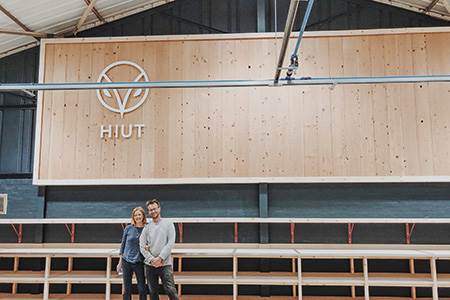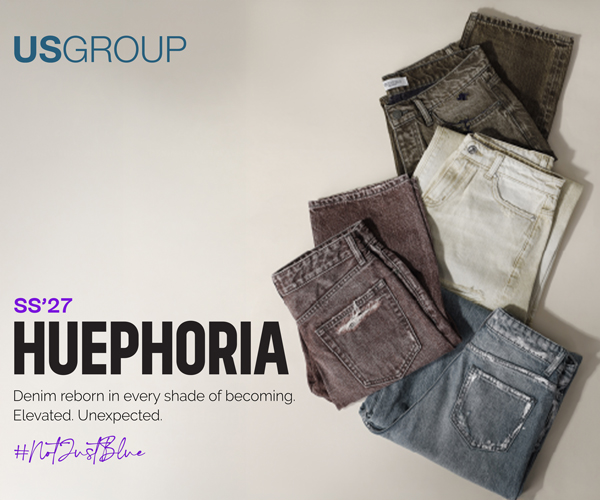Goodbye to guesswork

Co-founder David Hieatt tells us how made-to-order, consistency and its ‘salt-of-the-earth' GrandMasters are working to keep Hiut’s factory lights on along Wales’ Ceredigion coast. Maverick style.
Q: Change is afoot at Hiut. What inspired your pivot to a made-to-order (MTO) model, and what impact, if any, has this had on your GrandMasters thus far?
A: I think the MTO model is really about the desire to stop making stuff people don’t want.
When brands make a sales forecast, it is really a guess. Sometimes, the guess is correct. Sometimes, it isn't. And that is why there’s a huge amount of waste created by brands that are in the guessing business.
Because it’s hard to get the guess right. So, when you say to yourself, I’m no longer in the guessing business, and I’m only going to make jeans that have been ordered, you cut down the waste almost to zero. If we want to be a low-impact business, then we must stop making product that hasn’t been asked for.
When you begin to think about it, it is common sense, but this approach isn’t common practice. My feeling is more and more brands which are keen to minimise the waste will begin to produce using a MTO model.
At first, lots of our customers didn’t understand what a time slot was, but really it was just like a reservation for a table at a restaurant. A time slot was you making a reservation. Except it wasn’t a restaurant but a factory floor.
So, the effect this had on the GrandMasters is that every time they make a pair of jeans, they know it is to satisfy an order. That means that the time they spend making one of the best pairs of jeans in the world is never wasted.
I think that in the future, businesses will stop guessing and only really make what has been ordered.
How long did it take you to make the shift? Was everybody on board from the start?
We probably started talking about it for almost a year. We knew that the BBC ‘Inside the Factory’ documentary would air in January and we would be a hit, with a huge number of orders in a short window of time.
So, we used this as a catalyst to make the move to MTO. When the programme aired, instead of taking orders we told everyone to register to our newsletter. At the time, all January time slots were sold out, so our first email out was telling everyone that the next time slots would be in February. It worked. We were then sold out of February slots. Then March.
Was everyone on board? I think there was a worry about not taking orders when you have the attention of four million people, for sure.
In hindsight, it worked. But that wasn’t clear from the start. So, I understand the reservations. But now everyone gets what we are trying to do. It makes the factory and the business more efficient.
How have sales been, both before and after MTO? And how have Hiut’s customers responded? Would you say you’ve had more sales or more engagement, for example, since making the switch?
It is early days, but each month has been fully allocated. And you can’t be more than 100% capacity. But time will always reveal the truth.
Did the BBC Inside the Factory feature ultimately help raise brand awareness? Were you already planning on making these changes at the time of filming?
Yes, Inside the Factory is a big show. Four million people. But it also gets repeated so many times. So, it is a gift that keeps giving. It definitely got us out there again. The move to MTO was going to happen anyway, but the timing helped. We had very low stock, and then we had a huge demand. We used those two factors to help us move over. It was good timing. And a little bit of luck.
How will working in this new way influence your fabric buying decisions? Are your still working with materials you already had in stock?
Our core range stays the same, so that is very predictable. But with having the time slots allocated, it gives us more time to plan our short runs, which are limited editions of special or rare denims. I guess it allows us to have more creativity and more time to find the ‘story’ denims that we love.
And have you noticed any changes in shopping behaviour, particularly in customers’ denim or price-point preferences, since they’re now consciously investing in a bespoke pair of jeans?
Everyone is used to having what they want, when they want it. But when you make an order, that is not the case any more. And, sure, we will lose customers because of that. But there is also a thing called anticipation. To look forward to something. Sometimes, the longer you wait, the more you look forward to it.
The price point of our jeans has always been at the super-premium end. We use the best denim, and they are made by GrandMasters in our factory in Wales. So, for some, the price point was beyond them. Plus, now you have also to wait. That has created an extra barrier that for some is too much.
But, for those who love their denim and want the best, they are happy to wait. As they say, good things come to those who wait. And great things come to those who wait a little longer.
How closely do you work with suppliers like Candiani on denim R&D? What qualities do you particularly cherish in Hiut-selected denim?
Candiani are mavericks. They are situated in a nature reserve; they are hell-bent on making the world’s first biodegradable jeans. And I want Hiut to be working with them every step of the way. We work with them closely, but I would like to be even closer – like chewing gum stuck to the pavement.
In terms of selecting denim, the sweet spot is how good is the denim and what good does it do? You want to find the intersection. That is the tension. We don’t make it easy for ourselves.
How is your latest round of GrandMaster recruitment going? What special skills, experience or knowledge do you typically look for? And how, what and from whom do trainees learn?
Ongoing. We thought we had found one. But they couldn’t find a dog-sitter.
For real. The essence is to find someone who is missing making. Making is addictive for some. The satisfaction it gives. Then, finding new makers is vital. But this is our biggest challenge. 100%.
So yeah, will keep you posted.
As a keen wordsmith, has working alongside Hiut’s GrandMasters taught you more about patience or pragmatism, would you say?
The GrandMasters have taught me about consistency. Consistency of effort. Consistency of getting on with it.
Consistency of belief. I don’t really know what the phrase ‘salt of the earth’ means, but I know they are it. Good people with world-class skills. I love them.
PHOTO: Co-founders David and Clare Hieatt, both also responsible for the DO Lectures. Hiut Denim Co












